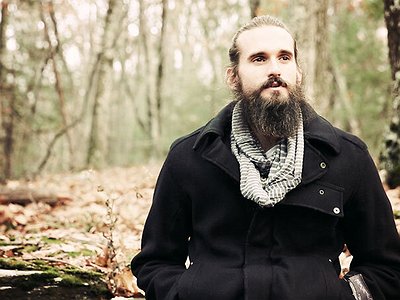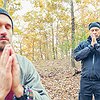Part 2
Take us through a day in your life, from a possible morning routine through to your work, please. Do you have a fixed schedule? How do music and other aspects of your life feed back into each other - do you separate them or instead try to make them blend seamlessly?
My life and schedule has dramatically shifted over the last two years since the birth of my son. I generally keep a very tight schedule between home and work, revolving around his schedule. I’m up between 5-5:30am, I read and have coffee till about 6:40, I then meditate for an hour, and then watch my son until 9am. At that point I’m getting ready for the day, and usually try to get some exercise in. I’m then at the studio usually working between 11am-6pm. I come home for dinner, put down the baby and then try to practice piano for an hour up at the barn. Afterwards, I’m pretty beat. My wife and I used to watch something for 45m to an hour, but we’re trying to cut back on the screen consumption, so I’ll read, meditate or go to bed early.
Since I was young, I’ve struggled with the anxiety of feeling I “need” to work, or I’m not working enough. Through years of self-observation and an understanding of the bigger forces at work I’ve come to realize this is a very unwholesome and harmful way of viewing things. Still, deprogramming this anxiety is likely to be a lifelong pursuit for me as it’s so ingrained in my ancestral tradition and in my culture. The answer is always to be mindful and not cling or be present and let go. It’s amazing the unraveling of mental tangles this simple intention can help to ease.
Can you talk about a breakthrough work, event or performance in your career? Why does it feel special to you? When, why and how did you start working on it, what were some of the motivations and ideas behind it?
A major breakthrough work for me that changed my view and capacity on technology, production and my own composition would be my work “Bardo”.
It was originally a commission for the Ann Hamilton Tower in Sonoma County California. Just a strange monolithic sci-fi looking tower sitting out in the middle of nowhere. But I constructed a piece for a chamber orchestra with dancers playing on a spiral staircase where they couldn’t see each other clearly. I had to devise an extremely complicated metronome system so all the musicians could monitor the tempo and meter changes of the score. It was really mind-bending. But the result was phenomenal, and it made me realize the immense potential of spatial installation performances, an idea I’d like to explore more deeply. In fact, Gareth and I are talking about some interesting ideas for Nous Alpha in this spirit.
The motivations for Bardo were quite intense. My childhood best friend died of suicide, and in his final letter he requested I wrote a piece to commemorate him. Bardo was this. It was a musical narrative of the stages of the Bardos as described in the Tibetan Book of the Dead. I imagined that every time it was played it was a kind of prayer radiating out into the cosmos to bless the continuation of his flowing mind stream.
There are many descriptions of the ideal state of mind for being creative. What is it like for you? What supports this ideal state of mind and what are distractions? Are there strategies to enter into this state more easily?
I personally have found that my life is much richer, content, focused and productive when I am incorporating a balanced amount of regular mind/spirit practice into my day. I’m a devoted, now fifteen year meditator. Any creative development or accomplishments I’ve incurred would be enormously assisted by this practice.
But then there is also the obvious attribution of effort. The very fact of showing up every day is such an important ingredient. This kind of persistence and devotion is shown by so many artists, be it Beeple today to Bach and Stravinsky, etc. However, there also is a fine line that needs to be balanced between this driving burning ambition and the importance of actually enjoying your life, which for me is cultivated through the obvious but challenging task of concentrating your mind on the present moment and approaching the world with a mind of Love and kindness.
Music and sounds can heal, but they can also hurt. Do you personally have experiences with either or both of these? Where do you personally see the biggest need and potential for music as a tool for healing?
Yes, I love metal and loud music and I’ve been to many concerts and played a lot of shows and jam sessions where my ears were dangerously ringing. Also, I’ve been in situations where very heavy body shaking bass can make you nauseous. Like any technology it is driven by the intention as well as physiological factors. I personally believe in the power of sound healing and mantras, as I’ve studied and explored them for years. I suggest people explore sound therapies where we use our own voice to vibrate certain parts of our bodies from the inside, either to break up tension or pain, or to fertilize the potential for positive states of opening.
But music also has tremendous healing opportunity as a listener and as a creator. The creation of music has been such a therapeutic part of my life, helping me to process grief and sorrow and to inspire and give meaning to moments of melancholy or despair. I believe the benefits of this will only grow as we uncover the neurological effects of music and sound practices over the coming years.
There is a fine line between cultural exchange and appropriation. What are your thoughts on the limits of copying, using cultural signs and symbols and the cultural/social/gender specificity of art?
Intellectual property rights is a complex issue in which I’m too ambivalent to take a stand. My viewpoints are divided upon whether I’m looking at it from a relative or an absolute reality. Relatively people have a right to have their work legally protected, on an ultimate level though, I don’t believe anyone really owns their work at all.
Did the artist choose their background, country, parents, skill, time period they emerged in? There are so many factors both internal and external, infinite in fact, that make up a person, so claiming accomplishments as your own is the very epitome of the pervasive ignorance that has brought out the worst aspects of our species. However, we’re certainly not even close to a place of complete intellectual sharing, nor am I there yet, so for now I believe in copyrighting as there are too many bad actors out there who would try to profit off your own work.
Culturally and socially is a similar answer. We’re one connected species, what we create will one day fuse into a kind of variation of early Earthling expressions. But the defining factor for me is that things should be organized and allowed in a way that prevents suffering, whatever that may be.
Our sense of hearing shares intriguing connections to other senses. From your experience, what are some of the most inspiring overlaps between different senses - and what do they tell us about the way our senses work?
On a first thought, I experience music most clearly through sound, visual and touch sensations with the bridge between them being the Mind. In classical Buddhism it is taught there are six senses, the obvious five and then the Mind as its own sense, which we experience as thoughts, memory perceptions, mental formations etc. that don’t necessarily rely on an external object. I often experience music through the mind sense. Some of my best work is a kind of mind visual seeing/hearing where I conceptualize an abstract idea or concept that I then bring out in musical form.
I noticed in my late twenties that I often experienced music more like architecture as opposed to some kind of amorphous sound expression. In fact, the thing I love most about classical music is the conscious presentation of this architecture, it’s part of the skill set that most of these composers developed. I often “see” a piece more than hear it, and this seeing is actually quite visual. It has a kind of geometry in the mind, so much so that I sometimes look at the ocean, the branches and leaves of a tree, or the shapes of a mountain and imagine how its structure would ‘sound’ through music.
Art can be a purpose in its own right, but it can also directly feed back into everyday life, take on a social and political role and lead to more engagement. Can you describe your approach to art and being an artist?
I’ve gone back and forth about my perception of the importance of activist artists. Many of my early influences were considered activist artists, including Woodie Guthrie and Bob Dylan (whether he wanted to be seen that way or not).
I often personally feel artists are too trapped in their own self-importance. Of course, there are some songs that have really made an impact in the world, and everything is interwoven and impacts everything and so is a necessary part of the whole. However, I think someone like Jane Goodall, Nelson Mandala, or Thich Nhat Hanh, and so many others are doing the real noble work of helping the world in the deepest ways. Music is there to support at times and might motivate, but I certainly don’t think the world of commercial music is essential to our evolution of humanity.
Personal and social relationships with sound as a source of communication and healing are important as the mechanical waves that move the air between us are part of the nourishment of consciousness that we consume. But I personally think there is a lot more important work being done through the sciences, generosity and charity than what most musicians are doing with their lives, myself included.
What can music express about life and death which words alone may not?
Words are signs, attempting to point to an object or thing. But music can be the thing itself.
We’ve all heard the quotes about music having the potential to fill in the space where words fail to reach. I see music more as a teacher of phenomenon and being itself. The arising and cessation of sounds, which is what we experience as music, tells us everything we need to know about life and what’s going on here. We can see, hear, enjoy, mourn, and learn from the dancing of harmonies, dissonances and grooves that are coming into and out of existence in each precious moment of our lives.






